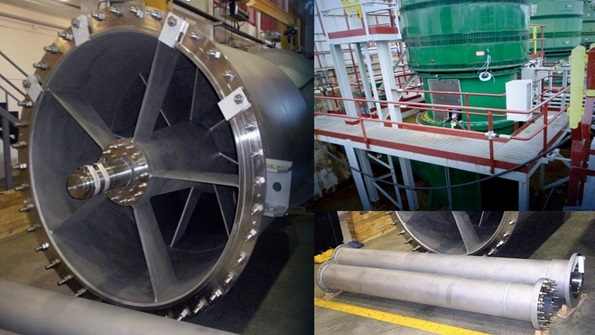Editorial: Desalination Is Booming, But Faces a Saltwater Reality Check

Editorial: Desalination Is Booming, But Faces a Saltwater Reality Check (Image source: Greene Tweed)
Climate change is threatening to exacerbate the challenge with prolonged droughts parching the land in some regions and unpredictable rainfall overwhelming infrastructure and contaminating freshwater resources in other areas.
In short, water resources are no longer reliable, making global water security a significant and pressing issue. The impact of water shortages extends beyond lack of access to safe and reliable drinking water. The economic activity dependent on water is an estimated $86 trillion, according to water market information platform Global Water Intelligence. Several industries, such as electric power plants, need lots of water for cooling and scarcity can disrupt their operations.
Combat Water Scarcity
As global freshwater sources become scarcer, desalination of saltwater into drinking water is emerging as a possible answer. Countries around the world are increasingly turning to saltwater desalination to combat water scarcity and ensure a sustainable supply of freshwater for drinking and irrigation purposes. Due to their arid climate and limited freshwater resources, middle eastern countries such as Saudi Arabia, United Arab Emirates, Kuwait and Qatar rely heavily on desalination to meet their water needs. Several other countries, including Spain and the US, are investing in desalination plants for seawater as well as brackish and wastewater. The most common form of desalination is reverse osmosis. This water purification process uses a semi-permeable membrane to separate water molecules from dissolved or suspended substances, which is an immensely energy-intense process, with pumps contributing a significant proportion. As a result, the pump equipment involved in the process of desalination needs to be as efficient as possible to reduce energy waste and improve sustainability.
The water industry is not alone. Power generation, chemical and industrial plants, which require vast amounts of water for cooling purposes, are increasingly exploring the use of saltwater for cooling systems through desalination processes. Desalinated seawater or brackish water can serve as a reliable alternative to freshwater, ensuring the continuous operation of a power plant even in freshwater stressed regions.
Prepare Pumps for Saltwater
Saltwater, however, is highly corrosive and abrasive. Traditionally, materials such as bronze, brass and/or rubber are used for pump bearings, which don’t hold up well in this type of operating environment.
It can damage equipment such as pumps in constant touch with seawater, brackish water, concentrated brine, and treatment chemicals. “Traditional, lower-grade, non-metallic or rubber wear parts in pumps require frequent replacement due to the abrasive environments in which they operate. Moreover, salinity in the coastal areas makes the surrounding air very humid and corrosive and wreaks havoc on pump efficiency and can cause damage, downtime, or failure,” says Greg Gedney, Industry Expansion Manager at Greene Tweed. Backed by his two-decades long experience in pumping technologies, he adds, “The abrasive and corrosive nature of seawater, brackish water, concentrated brine, and treatment chemicals can damage pump components made of traditional material, requiring more frequent replacement.
According to Dave Noblin, Product Manager of SEC Platform at Greene Tweed says, “By upgrading to components made of corrosion and abrasion-resistant composite materials, such as WR and AR, pump engineers can significantly lower the life cycle cost of pump operations by extending service life, reducing pump overhaul costs, and maintenance expenses.” This strategic selection of pump components, he explains, “will not just extend the lifespan of pump systems, but also pave the way for a more sustainable future.”
How Greene Tweed Helped Brunswick Nuclear Power Plant Prolong their Water Pump’s Life
Power plants, one of the largest water users globally, face a formidable challenge: the corrosive and abrasive threat of saltwater. From cooling systems to hydraulic operations, their critical pump components need to withstand the harsh seawater and brackish water environments.
Consider Duke Energy, the operators of the North Carolina-based Brunswick nuclear power plant. Back in 2015, they were looking to replace eight Circulating Water Pumps (CWP) being used to pump high volumes of seawater. Duke Energy engineers needed to upgrade the bearing from cutlass rubber because of delamination issues. “Presence of saltwater containing salt, slit, and sand can damage the mating shaft, its sleeve, and the rubber cutlass bearings in circulating water pumps,” says Greg Gedney, industry expansion manager at Greene Tweed, who was working with Flowserve to support Brunswick nuclear plant.
An external flush provided to each of the composite bearing locations in the pump would trigger an alarm when the flush dropped below five gallons per minute of flow to the bearings. The low flush alarm was set to two minutes of low conditions prior to tripping the power to the pumps, causing significant problems. Gedney explains why: “This meant that if the bearing flush flow wasn’t restored within two minutes, the pump would shut down and disrupt the process. Additionally, frequent starting and stopping of the pump can be highly detrimental to its performance.”
To reduce the disruptions, the nuclear plant’s engineering team requested Flowserve, the pump’s original equipment manufacturer, to extend the low flow / flush alarm from two minutes to 15 minutes on the new pumps. The increased alarm to trip time on the new pumps meant that the bearings in the pump needed to survive a minimum of 15 minutes under low-flow conditions.
Flowserve reached out to Greene Tweed and our engineers proposed AR-HT bearings, executing a bearing test program to validate AR-HT composite bearings in an environment tougher than requested – totally dry conditions. Tests were performed with AR-HT bearings and Stellite 12 shaft sleeves on the rotor, chosen due to their compatibility to saltwater and their surface hardness characteristics.
Greene Tweed’s AR-HT bearings surpassed expectations, by resisting wear and maintaining running clearances, for longer than 105 minutes – compared to the original request of just 15 minutes – in dry run conditions without any lubrication. The pumps upgraded with AR-HT bearings and Stellite 12 shaft sleeves, installed in 2016, have not required any significant maintenance since then. According to Duke Engineering, vibration levels are consistently low and smooth running. Since the bearing system is no longer the maintenance limiting factor of the CWPs, the preventive maintenance frequency is likely to extend beyond the planned 15 years,” says Gedney.
Encouraged by the results, Duke Brunswick plant engineers upgraded their service water pumps to the same combination: AR-HT bearings and Stellite 12 sleeves. “Our bearings delivered once again and will now be used in the upcoming replacement of the circulating water ocean discharge pumps,” he adds.
Author: Pragati Verma, Greene Tweed
Source: Greene, Tweed & Co. – Corporate






